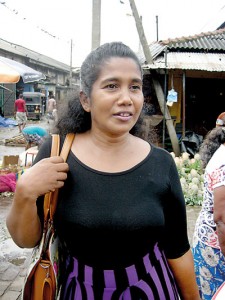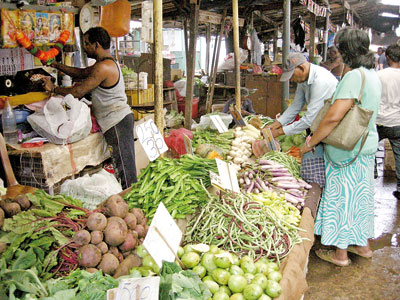News
Veggie traders and middlemen sucking consumers dry
Nadu is selling for a little less now, but a palm-sized coconut still costs Rs 85, up by Rs 10, in the Pettah and Ratmalana markets.

R M Kumari
While the state struggles to rein in runway prices of staple food items, traders and middlemen are profiting at will.
Farmers and consumers are being ripped off. Consumers are urging the Government to rein in middlemen and the traders.
In August, inflation jumped to 7.9% year-on-year from 4.5 percent last August, according to the Department of Census and Statistics. Inflation was largely driven by the food and non-food components of the index.
In a small eatery in the Pettah, a small bowl of chicken curry with just one piece, costs Rs 130 and a fish curry with one piece sells at Rs 100. But in the same eatery, a packet of lunch with a piece of chicken sells for Rs 150. The price of a meal of rice and fish is Rs 110.
Edward Ranasinha, 67, a resident from Dematagoda said vendors are selling food and grocery items at prices that they wish because Government regulatory agencies are ineffective. Prices of vegetables and fish vary drastically at different shops.
“Some traders are not displaying their prices,’’ he said, adding that actual prices some traders quote also differ from displayed prices.
Nissanka Bandara, 35, from Kandy, a construction site labourer in Colombo, said vendors rip off buyers like him, who are not familiar with prices in the city.
“Traders increase the prices of lunch or tea when there is even a slight increase in sugar or cooking gas prices. But they do not reduce the prices when these items cost less,’’ he said.
Consumers are also unhappy over the quality of the goods.

Kingsley Oliver
R M Kumari, 43, from Matara, complained that sellers sometimes mix both good and bad quality goods and demand higher prices.
Sriyani Perera, 65, from Gampaha, whom we met at the Pettah market, said she doubts the quality of the vegetables. Vendors select and put vegetables into the bag and there is no way to check the quality at the market.
“When we ask about the high prices or the quality of the goods from the traders they raise their voices,” she said. Abusive traders force her to keep quiet.
Kingsley Oliver, 70, from Kollupitiya, blames the Consumer Affairs Authority for its inactivity. The authority comes under the Ministry of Industry and Commerce.
He said many vendors are using dodgy weighing scales in wet markets. “When they weigh 1 kilo there is less than 900 grams,’’ he complained.
He said middlemen are making the highest profit and neither the farmer nor the consumer benefits. He urges state intervention to control the prices.
Meanwhile, Sunil Ranaweera, president of the Dambulla Combined Farmers Foundation, said some businesses and middlemen are exploiting the farmers by buying farm produce at low prices.
He said the businessmen create a low demand for produce by bargaining for lower prices. In reality all those who are bargaining with the farmers are working for the same businessmen.
“Usually, the businessmen buy the vegetables that are scarce in the market. Then they sell it at high prices,’’ he said.
Mr Ranaweera said many traders are exploiting the illiteracy of the farmers and they pay well below the actual value of the produce.
Manjula Suraweerachchi of another farmer association, said indebted farmers are targeted. Money lenders visit farmers just ahead of harvest time and pressure farmers to repay loans. And immediately afterwards, the wholesale businessmen visit. Caught between selling the produce quickly and repaying debts, the farmers agree to sell at bargain prices.

There are allegations that some businesses and middlemen are exploiting the farmers by buying farm produce at low prices. Pix by Athula Devapriya
Consumer Affairs Authority chairman, Hasitha Tillekeratne, said the authority can only act when maximum retail prices are imposed.
He said frequent raids are conducted. Last year, around 21,876 raids were conducted islandwide. This year, so far, 18,181 raids have been done. Vendors have been punished for not displaying prices.
Duminda Priyadarshana, a member of the cabinet sub-committee on cost of living, said members meet every week. Talks were held about rice and coconuts this past week.
“With the Government importing rice from India, we have noted that rice prices have dropped by Rs 4 to Rs 5. Coconuts can be sold for Rs 65 even in super markets,” he suggested.
| SOARING PRICES TRIGGER STATE INTERVENTION | |
| The state is stepping into the market to control prices of daily necessities including staple food items. Lanka Sathosa and the Coconut Cultivation Board are offering prices below the market rates. White kekulu, nadu, broken rice, samba, white kekulu samba will be sold for Rs 64, Rs 73, Rs 59, Rs 83 and Rs 89 respectively, at wholesale outlets while the price will be higher by Rs 1 at Lanka Sathosa retail outlets. In addition, 200 grams of sprats will be sold for Rs 99 while Bombay onions, Lanka potato, white sugar, dhal and 425g canned fish will be available for Rs 134, Rs 125, Rs 107, Rs. 152 and Rs 129 at Lanka Sathosa outlets. Lanka Sathosa chairman, T M K B Tennekoon, said that within the next two weeks, outlets will open at selected railway stations including Fort and Maradana. He said new outlets can be opened at other government institutions and expects 500 outlets by end of December. Traders will also be able to buy at wholesale prices from the 26 newly-established outlets. Kapila Yakandawala, chairman of the Coconut Cultivation Board, said nearly 1 million nuts will be released to the market. So far, more than 672,000 coconuts have been released. He claimed that prices have fallen to between Rs 65 and Rs 85. He expects a surplus of about 40 million nuts from the next season by the end of November and December and that prices will ease further. |

